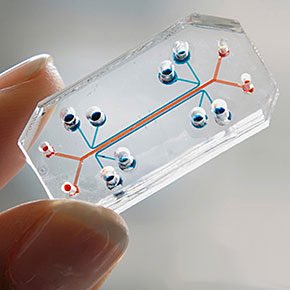Organs-on-Chips Promise to Reduce Testing Time for New Drugs
 Jan-30-20
Researchers have adapted computer microchip manufacturing methods to create microfluidic culture devices that mimic the functions of living human organs, including lung, kidney, skin, and bone.
Jan-30-20
Researchers have adapted computer microchip manufacturing methods to create microfluidic culture devices that mimic the functions of living human organs, including lung, kidney, skin, and bone.These microdevices offer an alternative to testing drugs on animals and could drastically reduce the $2 billion needed to complete clinical trials on a single compound.
Each 'Organ Chip' is made up of a clear flexible polymer about the size of a memory stick and contains hollow two parallel channels that are lined respectively with living human organ-specific cells and vascular endothelial cells representing a blood vessel. Forces, such as breathing motions, are then applied to mimic living organs.
More Info about this Invention:
[HARVARD.EDU][THEENGINEER.CO.UK]

Add Your Comment